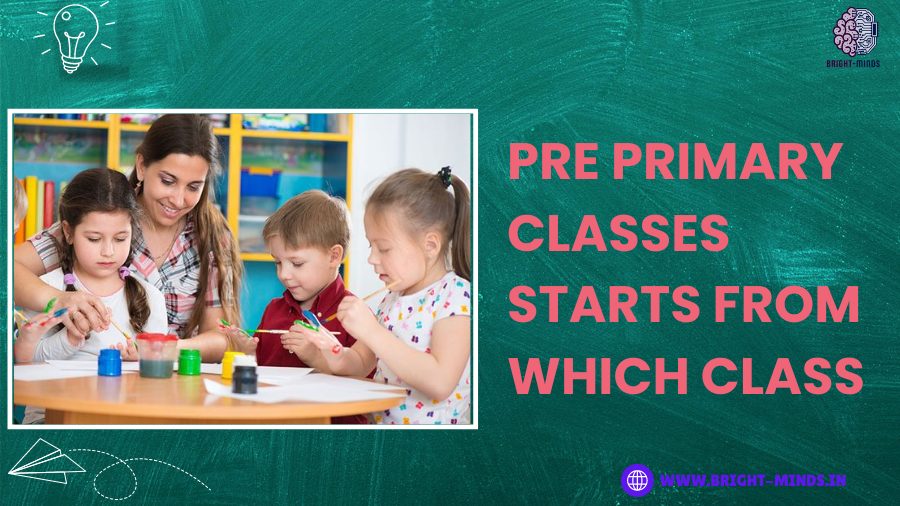Learn when Pre Primary Classes start and their importance in early childhood education. Discover the typical age range and key benefits for young learners
The decision to send your child to pre-primary school is a momentous one. It’s a chance for them to blossom in a nurturing environment, develop social skills, and gain a foundation for future academic success. But with so many options available, a common question arises
Understanding Pre Primary Classes Education
Pre-primary education, also known as early childhood education (ECE), caters to children aged roughly between 2.5 and 6 years old. This crucial phase lays the groundwork for a child’s cognitive, social, emotional, and physical development.
Within pre-primary education, there can be further classifications depending on the school system and geographical location. Some common terms you might encounter include:
- Preschool: Often referred to as nursery school in some regions, preschool typically covers children between 3 and 5 years old. It introduces basic learning concepts like numbers, letters, shapes, and colors through play-based activities.
- Pre-Kindergarten (Pre-K): This program, geared towards children aged 4 to 6, often incorporates a more structured curriculum alongside playtime. It helps prepare them for the transition to kindergarten, the first formal grade in elementary school.
- Kindergarten (KG): This class marks the official beginning of primary education and usually enrolls children between 5 and 6 years old. Here, the focus shifts towards foundational literacy and numeracy skills.
When Do Pre Primary Classes Start?
Pre Primary Classes typically begin as early as 2.5 years old, with different stages catering to specific age groups. These stages include Playgroup/Preschool, Nursery, and Pre-K, each with its unique focus and objectives.
1. Playgroup/Preschool (2.5-3 years old)
Overview: Playgroup or preschool programs are designed for toddlers as young as 2.5 years old. These early education programs prioritize socialization, exploration through play, and the development of basic motor skills.
Focus Areas:
- Socialization: Children learn to interact with their peers, share, and take turns. These early interactions are crucial for developing social skills and emotional intelligence.
- Exploration Through Play: Play is a vital component of learning at this stage. Children explore their environment, engage in imaginative play, and develop cognitive skills through hands-on activities.
- Basic Motor Skill Development: Activities such as drawing, building with blocks, and simple physical exercises help enhance fine and gross motor skills.
Activities:
- Sensory Play: Activities involving sand, water, and various textures stimulate sensory development.
- Music and Movement: Singing, dancing, and rhythm exercises improve coordination and auditory skills.
- Art and Craft: Simple art projects foster creativity and fine motor control.
2. Nursery (3-4 years old)
Overview: Nursery classes are a common starting point for many pre-primary programs. They introduce children to basic educational concepts through engaging activities and interactive learning.
Focus Areas:
- Basic Concepts: Children learn about shapes, colors, and numbers. These foundational concepts are taught through play-based learning and storytelling.
- Language Development: Vocabulary building, simple sentence formation, and early literacy skills are emphasized.
- Emotional and Social Development: Nursery programs continue to foster social skills, cooperation, and empathy.
Activities:
- Storytime: Reading aloud and storytelling sessions enhance listening skills and imagination.
- Hands-On Learning: Puzzles, building blocks, and sorting games teach problem-solving and critical thinking.
- Group Activities: Collaborative projects and games encourage teamwork and social interaction.
3. Pre-K (4-5 years old)
Overview: Pre-K (Pre-Kindergarten) programs are more structured than nursery classes, focusing on preparing children for the transition to kindergarten. These programs emphasize academic readiness and social competence.
Focus Areas:
- Letter Recognition and Phonics: Children learn the alphabet, letter sounds, and begin to develop early reading skills.
- Basic Math Skills: Counting, simple arithmetic, and understanding patterns are introduced.
- Social Interaction: Activities promote cooperation, conflict resolution, and classroom behavior.
Activities:
- Literacy Games: Phonics games, letter tracing, and beginning reading exercises develop literacy skills.
- Math Manipulatives: Counting beads, number puzzles, and shape sorting enhance mathematical understanding.
- Structured Play: Guided play sessions encourage following instructions, taking turns, and cooperative play.
Choosing the Right Starting Age
The ideal starting age for pre-primary education depends on several factors, including:
- Your Child’s Developmental Milestones: Every child develops at their own pace. Consider your child’s social skills, independence level, and ability to follow instructions.
- School Readiness: Look for signs that your child is showing interest in learning, enjoys interacting with other children, and can follow basic routines.
- Family Needs and Lifestyle: Consider your work schedule, childcare arrangements, and the overall family dynamic when deciding if pre-primary school is a good fit for your current situation.
Benefits of Early Enrollment
While pre-primary education isn’t mandatory, there are numerous benefits to enrolling your child at an appropriate age. Here are some key advantages:
- Social and Emotional Development: Pre Primary Classes schools provide opportunities for children to socialize with peers, develop communication skills, learn to share, and build confidence.
- Cognitive Growth: Through play-based learning and interactive activities, children are introduced to basic concepts like shapes, colors, numbers, and letters, fostering a love for learning.
- Preparation for Kindergarten: Pre Primary Classes programs help children develop the necessary skills and routines needed to thrive in a more structured kindergarten environment.
Conclusion
There’s no single “right” answer to when a child should begin Pre Primary Classes Program. By understanding the different options available, considering your child’s individual needs, and weighing the potential benefits, you can make an informed decision that sets your child on the path to a successful and enriching educational journey.
you may be interested in this blog here:-
5 Surprising Ways to Master English Grammar Rules: A Story of Discovery

